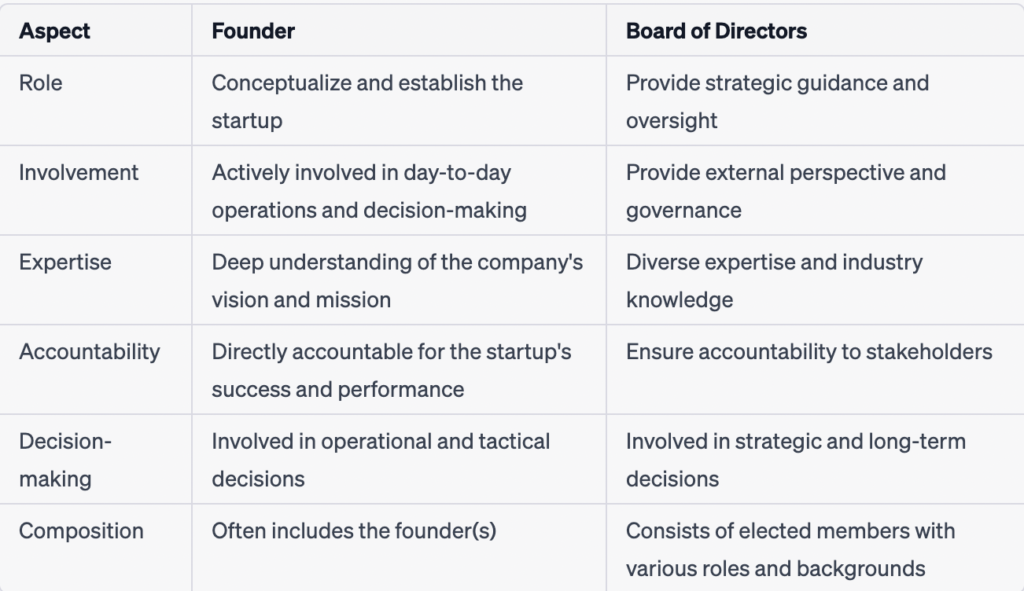Board of Directors: A Key Pillar of Startup Success
If you’re an entrepreneur, you know how overwhelming it can be to launch and grow a startup. There are so many moving parts to keep track of: product development, marketing, finance, legal, and so much more. That’s where having a strong board of directors can be a game-changer.
In this post, we’ll explore the critical role that a board of directors plays in a startup’s success. We’ll also discuss the key characteristics that make for an effective board, and how to assemble a top-notch team.
What is a Board of Directors?
Let’s start with the basics: what is a board of directors?
Simply put, a board is a group of individuals who are elected to oversee the management of a company.
The board’s primary role is to provide strategic guidance and oversight to the CEO and other executives.
In a startup, the board typically consists of a mix of internal and external members.
Internal members are often founders or senior executives, while external members are independent directors who bring outside expertise and perspective to the company.
The Role of a Board in a Startup
So, what exactly does a board of directors do in a startup?
The answer is: a lot!
Here are just a few of the key responsibilities of a startup board:
- Strategic planning: The board plays a crucial role in setting the strategic direction of the company. They work closely with the CEO and other executives to develop long-term goals and plans, and to ensure that the company is on track to achieve them.
- Oversight: The board provides oversight and accountability for the company’s management team. They review financial reports, monitor performance metrics, and ensure that the company is complying with relevant laws and regulations.
- Hiring and firing: The board is typically involved in hiring key executives, such as the CEO or CFO. They may also be involved in firing executives who are not performing up to expectations.
- Fundraising: The board often plays a critical role in fundraising efforts. They may help to identify potential investors, make introductions, and provide guidance on the fundraising process.
- Risk management: The board is responsible for identifying and managing risks that could impact the company’s success. They work with the management team to develop risk mitigation strategies and ensure that the company is adequately protected.
As you can see, the board of directors is a key pillar of startup success.
By providing strategic guidance, oversight, and accountability, they help to ensure that the company stays on track and achieves its goals.
Difference between the founder/s & Board of directors
The founder of a startup is the individual or group of individuals who conceive the idea for the company, take the initiative to establish it, and are often responsible for its early-stage development.
Founders typically have a deep understanding of the company’s vision, mission, and goals. They are actively involved in the day-to-day operations, decision-making, and execution of the startup’s strategy.
On the other hand, the board of directors is a group of individuals elected to oversee the management and provide strategic guidance to the company. The board’s primary role is to provide oversight, set the strategic direction, and ensure accountability to stakeholders.
Board members, including founders, bring diverse expertise, networks, and perspectives to guide the startup’s growth.
While founders are often intimately involved in the startup’s operations, the board provides an external perspective, governance, and independent decision-making.

Characteristics of an Effective Board
Now that we understand the role of a board in a startup, let’s talk about what makes for an effective board. Here are a few key characteristics to look for:
- Diversity: A diverse board brings a range of perspectives and experiences to the table. Look for individuals with different backgrounds, skills, and perspectives.
- Expertise: Your board should include individuals with expertise in key areas such as finance, marketing, legal, and technology.
- Independence: External board members should be truly independent and free from conflicts of interest. They should be willing to ask tough questions and provide honest feedback.
- Engagement: A board that is engaged and invested in the company’s success is crucial. Look for individuals who are willing to roll up their sleeves and get involved.
- Trust: Trust is essential in any board relationship. You need to be able to trust that your board members have the company’s best interests at heart.
How to Build a Strong Board?
We know what makes for an effective board, let’s talk about how to build one. Here are a few tips:
- Start early: It’s never too early to start thinking about your board. Assemble a group of advisors and mentors early on in your startup’s life cycle to help guide you through the early stages.
- Look for complementary skills: As you’re building your board, look for individuals who bring complementary skills and expertise to the table. For example, if you’re a technical founder, you may want to look for board members with marketing or finance backgrounds.
- Network: Networking is key when it comes to building a board. Attend industry events, reach out to mentors and advisors, and use your existing network to identify potential board members.
- Be transparent: When you’re approaching potential board members, be transparent about what you’re looking for and what you hope to achieve. This will help to ensure that everyone is on the same page from the outset.
- Set expectations: It’s important to set clear expectations for your board members from the outset. This includes things like time commitments, compensation, and specific responsibilities.
Who can be a part of the Board?
A startup board typically consists of a diverse group of individuals who bring different perspectives, skills, and experiences to the table.
While the specific composition can vary depending on the startup’s needs and stage of growth, here are some common roles and individuals who can be part of a startup board:
- Founders: Founders of the startup often play a key role on the board. They bring their vision, deep knowledge of the company, and entrepreneurial expertise to guide its direction.
- Investors: Investors, especially those who have made significant investments in the startup, may have a seat on the board. Their involvement can provide strategic guidance, access to networks, and valuable industry insights.
- Independent Directors: Independent directors are individuals who are not directly affiliated with the company or its investors. They bring an objective viewpoint and diverse expertise to the board. Independent directors can offer valuable insights, challenge assumptions, and ensure good governance practices.
- Industry Experts: Depending on the nature of the startup’s industry, having industry experts on the board can be highly beneficial. These individuals have deep knowledge and experience in the specific sector in which the startup operates. They can provide strategic guidance, and industry connections, and help navigate challenges unique to the industry.
- Functional Experts: Startups may also include board members with specific functional expertise, such as finance, marketing, technology, or legal. These individuals bring valuable insights and can help guide the startup’s decision-making in their respective areas.
- Advisory Board Members: While not formal board members, startups may have an advisory board consisting of industry leaders, subject matter experts, or mentors. Advisory board members provide guidance, mentorship, and specific expertise to the startup, without the same level of fiduciary responsibility as formal board members.
- CEO and Key Executives: In many cases, the CEO serves on the board as an executive director. Key executives may also have a seat on the board, depending on the size and structure of the startup. Their inclusion ensures alignment between the board and management, fosters effective communication and enables strategic decision-making.
What’s the ideal size of a startup board?
When it comes to the size of a startup board, there is no one-size-fits-all answer.
The optimal board size can vary depending on several factors, including the stage of the startup, the industry, and the specific needs of the company. However, there are some general guidelines to consider when determining the ideal size of a startup board.
Small Boards for Early-stage Startups
In the early stages of a startup, it is common to have a smaller board consisting of a few key individuals. This lean approach allows for more agility and faster decision-making, which can be crucial in the early days of a company.
A common structure for early-stage startups is a board of three to five members. This typically includes the founder or founders, an outside investor or advisor, and possibly a domain expert or industry veteran who can provide valuable insights and guidance.
With a smaller board, it is easier to maintain open lines of communication and ensure that all members are actively engaged in the decision-making process. This can be particularly beneficial when the startup is still refining its business model and rapidly iterating on its product or service.
Expansion as the Startup Grows
As a startup progresses and reaches later stages of growth, it may be appropriate to expand the board to include additional members. This expansion is often driven by the need for diverse expertise, expanded networks, and increased oversight.
The exact size of an expanded board can vary, but it is generally recommended to strike a balance between having enough members to provide valuable input and oversight while avoiding excessive bureaucracy and decision-making challenges.
A common approach for scaling startups is to have a board consisting of five to nine members. This expanded board may include a mix of internal members (such as founders and key executives) and external members (such as independent directors, industry experts, or representatives from major investors).
Having a larger board can bring in a broader range of perspectives, skills, and networks, which can be advantageous as the startup faces more complex challenges and strategic decisions.
Factors to Consider
When determining the size of a startup board, there are several factors to consider:
- Expertise: Ensure that the board includes members with diverse expertise and skill sets that align with the startup’s needs. This can include industry knowledge, functional expertise (such as finance or marketing), or specific domain knowledge.
- Independence: Strive for a balanced mix of internal and external board members. External directors should be independent and free from conflicts of interest to provide unbiased guidance and oversight.
- Communication and Decision-making: Consider how the board’s size may impact effective communication and decision-making. A smaller board may enable more efficient discussions and faster decision-making, while a larger board may require more structured processes to ensure all members are heard.
- Governance and Oversight: Ensure the board has sufficient capacity to provide oversight, monitor performance, and mitigate risks. This becomes especially critical as the startup grows and faces increased regulatory and compliance requirements.
Common Board Mistakes to Avoid
As important as it is to know what makes for an effective board, it’s also important to know what mistakes to avoid. Here are a few common board mistakes that startups make:
- Lack of diversity: A lack of diversity can lead to groupthink and a narrow perspective. Make sure your board includes individuals with different backgrounds, skills, and perspectives.
- Overreliance on the CEO: While the CEO is an important member of the board, it’s important to ensure that the board remains independent and provides oversight and accountability for the CEO and other executives.
- Not setting clear expectations: As we mentioned earlier, it’s important to set clear expectations for your board members from the outset. This includes things like time commitments, compensation, and specific responsibilities.
- Micromanaging: The board’s role is to provide strategic guidance and oversight, not to micromanage day-to-day operations. Make sure you strike the right balance.
- Not seeking outside expertise: External board members can provide valuable outside expertise and perspective. Don’t be afraid to bring in outside experts as needed.
Related Posts
Conclusion
In conclusion, a strong board of directors is essential for startup success. By providing strategic guidance, oversight, and accountability, a board can help ensure that your startup stays on track and achieves its goals.
When building your board, look for individuals with diverse backgrounds and complementary skills, and set clear expectations from the outset. Avoid common board mistakes such as overreliance on the CEO or micromanaging, and always be willing to seek outside expertise when needed.
Remember, a board is not just a group of individuals who sit around a table once a quarter. A board is a key pillar of your startup’s success, and should be treated as such. With the right board in place, your startup can achieve great things.


















